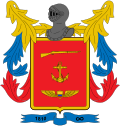History of the Course
The course was created as a result of the reform that took place inside the National Army of Colombia organization during the early 60s as a way to specialize and refocus the national army towards an irregular conflict with armed peasants in the mountains of Colombia. Inexperienced and with little knowledge of guerrilla warfare the Colombian Army sent its own officers to Fort Benning in Georgia, United States so they could take the Ranger Course that takes place there and as a way to apply their acquired knowledge in Colombia's specific situation.
The techniques learned in the American course were modified and taught to officers and NCOs of the Army and some enlisted and ranking officers of the Naval Infantry. This techniques were later spread across the Military Forces.
In 1959, Captain Hernando Bernal Duran raised the first Lancer Companies of the National Army, modeled after the US Army Rangers and the Korean War Ranger Companies (applying lessons learned in the Colombian Army peacekeeping deployments of the Korean War years prior). These newly created companies were more agile and flexible thus, leading to more successful operations. They were added as supportive personnel for units where the enemy was even more aggressive and active.
In 1966 an outbreak of dispersed bandits called for the creation of even sharper and faster units. This year the Colombian Army's military command put into effect a more extensive training program to combat the rebels; this program would later become a single course called "Contraguerrillas" and was put on the Lancer program.
Since this time the Lancero course has focused on the training of Soldiers, Army Officers and even Police Officers for the needs of a country with an enemy that hides among the civilian population. After more than forty years the course has gained some notoriety among military personnel around the globe largely due to its focusing on guerrilla warfare and not on regular military warfare. [1]
The Lancero badge is one of a number of foreign badges authorized to be worn on Canadian Armed Forces uniform. [2]
This page is based on this
Wikipedia article Text is available under the
CC BY-SA 4.0 license; additional terms may apply.
Images, videos and audio are available under their respective licenses.


